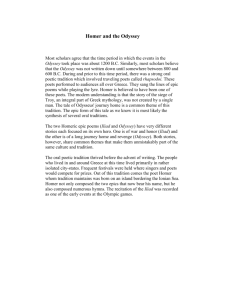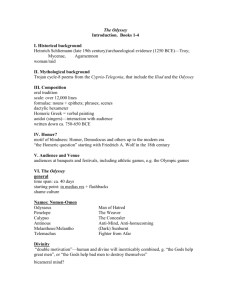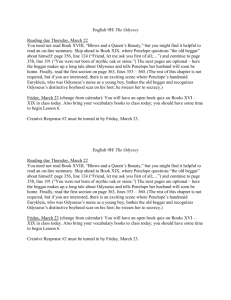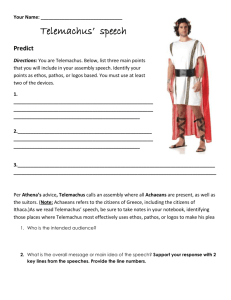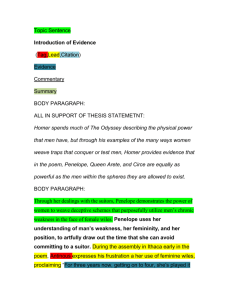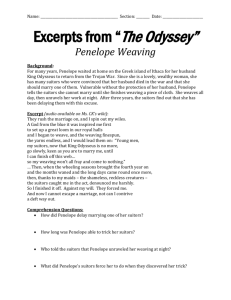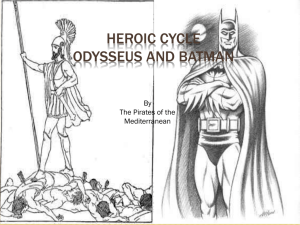The Odyssey Book Summaries Warning: You MUST read these
advertisement
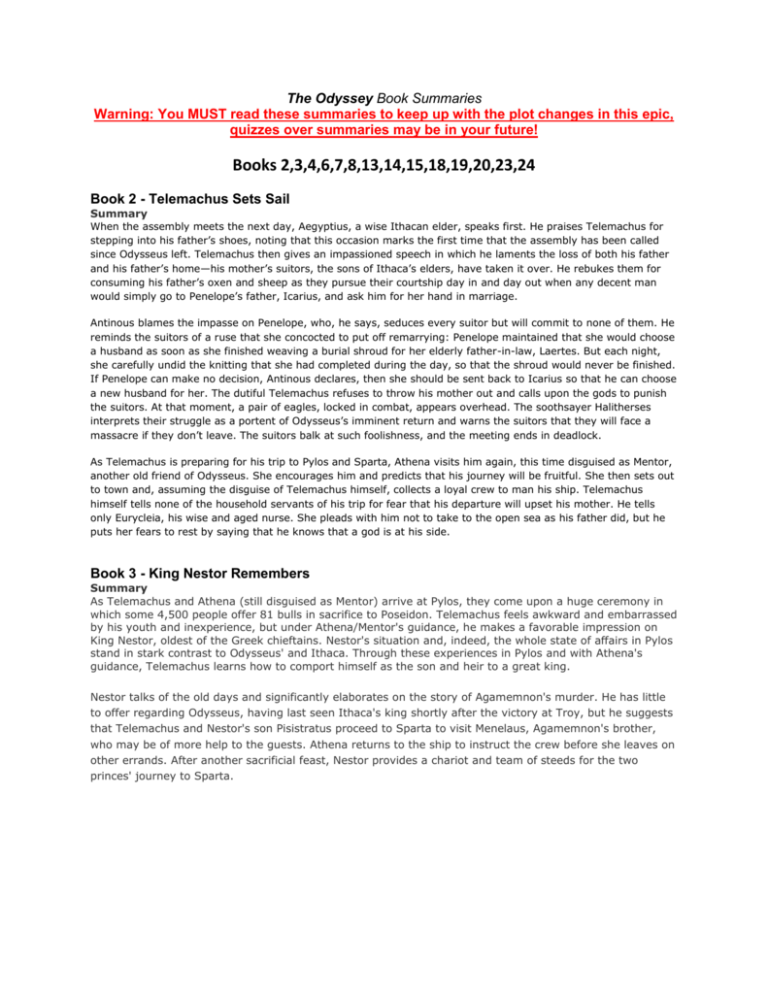
The Odyssey Book Summaries Warning: You MUST read these summaries to keep up with the plot changes in this epic, quizzes over summaries may be in your future! Books 2,3,4,6,7,8,13,14,15,18,19,20,23,24 Book 2 - Telemachus Sets Sail Summary When the assembly meets the next day, Aegyptius, a wise Ithacan elder, speaks first. He praises Telemachus for stepping into his father’s shoes, noting that this occasion marks the first time that the assembly has been called since Odysseus left. Telemachus then gives an impassioned speech in which he laments the loss of both his father and his father’s home—his mother’s suitors, the sons of Ithaca’s elders, have taken it over. He rebukes them for consuming his father’s oxen and sheep as they pursue their courtship day in and day out when any decent man would simply go to Penelope’s father, Icarius, and ask him for her hand in marriage. Antinous blames the impasse on Penelope, who, he says, seduces every suitor but will commit to none of them. He reminds the suitors of a ruse that she concocted to put off remarrying: Penelope maintained that she would choose a husband as soon as she finished weaving a burial shroud for her elderly father-in-law, Laertes. But each night, she carefully undid the knitting that she had completed during the day, so that the shroud would never be finished. If Penelope can make no decision, Antinous declares, then she should be sent back to Icarius so that he can choose a new husband for her. The dutiful Telemachus refuses to throw his mother out and calls upon the gods to punish the suitors. At that moment, a pair of eagles, locked in combat, appears overhead. The soothsayer Halitherses interprets their struggle as a portent of Odysseus’s imminent return and warns the suitors that they will face a massacre if they don’t leave. The suitors balk at such foolishness, and the meeting ends in deadlock. As Telemachus is preparing for his trip to Pylos and Sparta, Athena visits him again, this time disguised as Mentor, another old friend of Odysseus. She encourages him and predicts that his journey will be fruitful. She then sets out to town and, assuming the disguise of Telemachus himself, collects a loyal crew to man his ship. Telemachus himself tells none of the household servants of his trip for fear that his departure will upset his mother. He tells only Eurycleia, his wise and aged nurse. She pleads with him not to take to the open sea as his father did, but he puts her fears to rest by saying that he knows that a god is at his side. Book 3 - King Nestor Remembers Summary As Telemachus and Athena (still disguised as Mentor) arrive at Pylos, they come upon a huge ceremony in which some 4,500 people offer 81 bulls in sacrifice to Poseidon. Telemachus feels awkward and embarrassed by his youth and inexperience, but under Athena/Mentor's guidance, he makes a favorable impression on King Nestor, oldest of the Greek chieftains. Nestor's situation and, indeed, the whole state of affairs in Pylos stand in stark contrast to Odysseus' and Ithaca. Through these experiences in Pylos and with Athena's guidance, Telemachus learns how to comport himself as the son and heir to a great king. Nestor talks of the old days and significantly elaborates on the story of Agamemnon's murder. He has little to offer regarding Odysseus, having last seen Ithaca's king shortly after the victory at Troy, but he suggests that Telemachus and Nestor's son Pisistratus proceed to Sparta to visit Menelaus, Agamemnon's brother, who may be of more help to the guests. Athena returns to the ship to instruct the crew before she leaves on other errands. After another sacrificial feast, Nestor provides a chariot and team of steeds for the two princes' journey to Sparta. Book 4 - The King and Queen of Sparta Summary When they arrive at Sparta, Telemachus and Pisistratus are warmly welcomed. Telemachus is moved to tears by Menelaus' recollections of his friend Odysseus. The king and queen recall some of Odysseus' exploits at Troy but postpone serious talk until the next day. In the morning, Menelaus expresses outrage at the behavior of Penelope's suitors and encourages Telemachus by telling him that Odysseus is alive and a captive of Calypso. Back in Ithaca, the suitors have discovered that Telemachus is gone and plan to ambush his ship on its return. Penelope is distraught to learn of her son's trip and the planned assassination but is soothed by a vision sent by Athena. Homer leaves the plot of Telemachus dangling as selected suitors board a vessel to set up the surprise attack. Books 6-8 - Odysseus Among the Phaeacians Summary King Alcinous and Queen Arete rule the seafaring Phaeacians on the island of Scheria. The morning after Odysseus’ rugged landing, Athena (disguised as a friend) sends their daughter, Nausicaa, and some of her handmaidens to wash clothes near the spot where the beleaguered hero has collapsed. Nausicaa is a classic nubile beauty and seems somewhat attracted to the wayfaring stranger. She tells him how to find the palace and endear himself to the queen, thus insuring his safe passage home. Odysseus follows her instructions and is received hospitably at the royal household. He eventually reveals his identity and welcomes the Phaeacians’ offer to return him to Ithaca. First, however, he will tell them of his wanderings. These stories take up the next four books (nine through twelve), the best known part of the epic. Books 13-14 - Ithaca at Last; The Loyal Swineherd Summary Odysseus' account of his wanderings is complete. The Phaeacians know the rest. They are silent for a few seconds until Alcinous speaks to assure Odysseus that he will be returned safely to his home and to insist on even more gifts for the guest. Odysseus will arrive in Ithaca with treasure surpassing his fair share from Troy, which has long since been lost. Consistent with their custom, the Phaeacians provide the wanderer safe passage home. This annoys Poseidon who complains to Zeus. The gods agree on Poseidon's vengeance against the Phaeacians. Athena meets Odysseus on Ithaca and disguises him as an old beggar so that he can gain information without being recognized. He meets his loyal swineherd, Eumaeus, and is pleased with the man's hospitality as well as his devotion to his master, whom he does not recognize. Books 15-16 - The Prince Sets Sail for Home; Father and Son Summary Eumaeus and the beggar/Odysseus continue their conversations, the swineherd proving a perfect host and loyal servant. He tells the story of his life and how he came to Ithaca. Meanwhile, Athena guides Telemachus safely past the suitors' ambush; she tells him to go directly to the pig farm upon arrival at Ithaca. Eumaeus is sent to tell Penelope of her son's safe return. Athena takes this opportunity to alter Odysseus' appearance once more, turning him into a strapping image of his former self; he looks like a god to the shocked and skeptical Telemachus. Odysseus reveals his true identity to his son, and they work out a plan to defeat the suitors. Meanwhile, Antinous also has a plan and tells the other suitors how they must assassinate the prince. However, Amphinomus, the most decent of the suitors, calls for patience in order to learn the will of the gods before striking. His argument wins the day as the suitors agree to postpone the murder of Telemachus. Penelope confronts the intruders but is cut off by the smooth-talking Eurymachus. Back at the pig farm, Athena has turned Odysseus back into the old beggar. Among the mortals, only Telemachus knows who he really is. Book 18 - The Beggar-King at Ithaca Summary As late afternoon turns to evening, another vagabond, named Irus, arrives. He is a portly buffoon who is a comic favorite of the suitors. At the urging of Antinous, Irus picks a fight with beggar/Odysseus, which he soon regrets. As tensions increase, Odysseus tries in vain to warn Amphinomus, the best of the suitors, that trouble is coming and he should leave the group. In preparation for the meeting with Odysseus, Athena makes Penelope look even more beautiful. The queen chastises her son for permitting a fight and putting their guest at risk. Odysseus rebukes Penelope's maidservant Melantho for her neglect of the queen. The impudent girl has been indulging in an illicit affair with Eurymachus, Penelope's smooth-talking suitor. Odysseus and Eurymachus have a confrontation. Book 19 - Penelope and Her Guest Summary The suitors have gone home for the night. Odysseus instructs Telemachus to gather the weapons and hide them where they will not be readily available to the suitors the next day. Melantho, the disrespectful servant girl who sleeps with Eurymachus, confronts the beggar/Odysseus once more. Finally alone with Penelope, Odysseus offers convincing evidence that he knew her husband. Penelope seems suspicious about his identity. An old nurse, Eurycleia, is assigned the duty of bathing the guest. She innocently comments on how much he resembles her king, whom she raised from early childhood. Stunned, she identifies a scar, over his knee, left by a boar's tusk, and realizes that she is, indeed, bathing, her master. Odysseus immediately and sternly swears her to silence, forbidding her even to tell Penelope his identity. After the bath, Penelope rejoins the beggar/Odysseus and reveals that she will conduct a contest the following day to select a husband and satisfy the suitors. The challenge involves a feat that only Odysseus has performed before: stringing his great bow and shooting an arrow through a straight row of twelve axes. Odysseus enthusiastically approves of her plan. Book 20 - Portents Gather Summary Odysseus spends a restless night worrying about the impending battle. He angrily notices the maidservants as they sneak out to meet their lovers among the suitors. Suddenly Athena appears and assures him of vengeful victory. Penelope's room is nearby, and at dawn, he hears the end of her prayer for death if she cannot join her husband. He imagines (20.105) that she recognizes him and that they are together at last. Odysseus prays to Zeus for a sign of support and is answered by a thunderclap. This day is a special holiday on Ithaca, a festal celebration in honor of Apollo, god of archery. Melanthius, the goatherd, is in town for the celebration and again bullies Odysseus. Eumaeus, the swineherd, continues to earn his master's trust as does Philoetius, a cowherd. The suitors, talking again of assassinating Telemachus, continue their boorish behavior. One of the lot, Ctesippus, mocks beggar/Odysseus and hurls an oxhoof at the king. Telemachus berates the suitors and lists some of their many offenses. The seer Theoclymenus speaks ominously to them, offering one of their last warnings, but in their arrogance, the suitors respond with derisive laughter. Book 23 - The Great Rooted Bed Summary Now that the battle has ended and the house has been cleaned, good nurse Eurycleia scurries up to Penelope's quarters to tell her all that has happened. As much as Penelope would like to believe that her husband has returned and vanquished the suitors, she is cautious and goes to the great hall to see for herself. When she expresses ambivalence, Telemachus chides his mother for her skepticism. Odysseus gently suggests that the prince leave his parents to work things out. He also wants Telemachus to gather the servants and the bard and stage a fake wedding feast so that any passersby do not suspect the slaughter that has taken place. To assure herself of Odysseus' identity, Penelope tests him. As he listens, she asks Eurycleia to move the bedstead out of the couple's chamber and spread it with blankets. The king himself had carved the bed as a young man, shaping it out of a living olive tree that grew in the courtyard of the palace. He built the bedroom around the tree and would know that the bed cannot be moved. When Odysseus becomes upset that the original bed may have been destroyed, Penelope is relieved and accepts him as her long-absent husband. For the first time in 20 years, they spend a blissful night together. Athena delays the dawn to grant the couple more time. Book 24 – Peace Summary The final book opens with Hermes, the traditional guide, leading the souls of the dead suitors to the Land of the Dead (commonly referred to as Hades). These souls pass such Greek heroes as Achilles and Agamemnon. One of the suitors recites the story of the courtship of Penelope, her resistance to the suitors, and Odysseus' revenge. Back on Ithaca, Odysseus arrives at his father's farm and approaches Laertes, who looks and acts more like a slave than a former king. After identifying himself, Odysseus joins Laertes, Telemachus, and the two faithful herdsmen for a homecoming meal. Meanwhile, rumor of the slaughter has spread through the city, and Eupithes, father of Antinous (the aggressive leader of the suitors), calls for revenge. More than half of the men follow Eupithes to Laertes' farm, seeking Odysseus and vengeance. Only the intervention of Athena, again appearing as Mentor, avoids another major battle and perhaps civil war.

